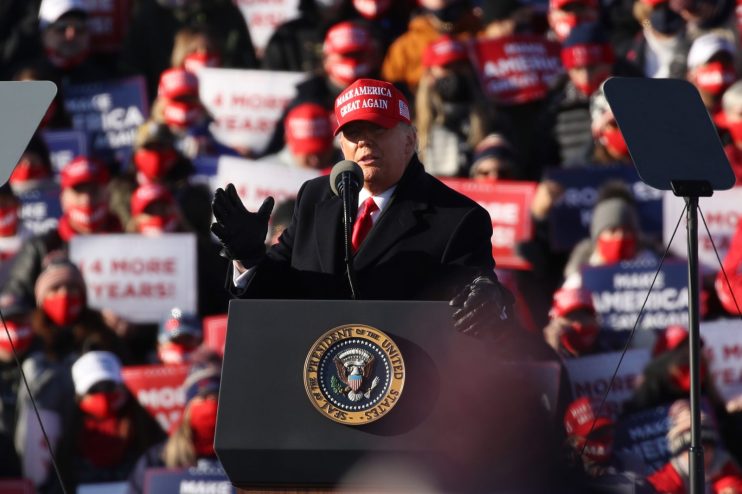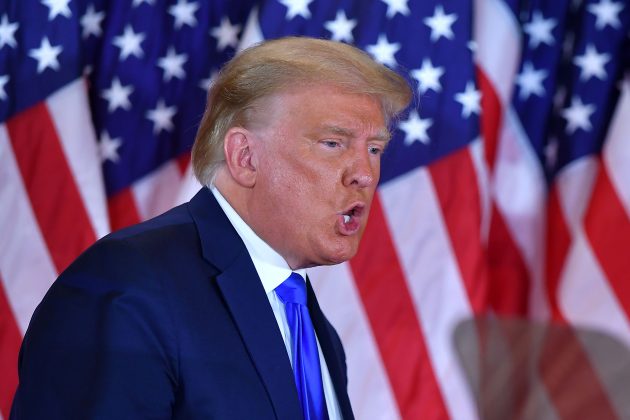‘Trumpism is here to stay’: The future of the Republican Party

WASHINGTON, D.C. – Factional infighting is the political battleground that is most commonly associated with parties of the left.
Labour’s intermittent factional psychodramas are a constant fixture of the UK’s political landscape, often to the detriment of its electoral success. America’s Democrats are also well versed in intra-party warfare, with the last four years providing fertile ground for battles over its future direction.
While this battle will likely continue into the 2020s for the Democrats, especially if Joe Biden loses today, it is the Republican Party that is bracing itself for all-out civil war. Win or lose the election, the Grand Old Party (GOP) faces a stark decision about where the future of the party lies.
Donald Trump’s nomination as the Repulican’s 2016 presidential candidate and his subsequent victory in the General Election wrenched the party into a completely new direction. His “America first” rhetoric spoke to disaffected voters in a way other establishment Republicans could not, after two failed presidential election cycles.
Trump, and his style of populism, is now inseparable from the Republican Party brand. His most ardent of supporters treat him like an infallible Roman ruler – they have taken to chanting “we love you” at his rallies – and many Republican politicians have jumped on the Trump train to ride his electoral success.
Washington lobbyist and longtime GOP campaigner Ed Stewart said regardless of tomorrow’s result “Trumpism is here to stay”, but that the party’s establishment is still gearing up for a fierce battle.
“We’re getting ready to see a civil war within the GOP,” he said.
Stewart said if Trump wins then his brand of politics will have an unshakeable mandate within the party, but even if he loses he will still remain the figurehead of the GOP.
He said: “If Donald Trump loses the election, which I do not think is a foregone conclusion right now, the way I look at it is on the day after the election after Trump loses – who is the leader of the Republican Party?
“The day after the election, if Trump loses, the answer in my mind to that question is Donald Trump.
“He has so dominated the thinking of the Republican Party for the past four years that there hasn’t been any more room for new leaders to emerge, for new ideas to emerge to counter Trumpism or offer an alternative view point or way forward.”
Stewart’s opinion is backed up by several sets of polling figures. Trump now has an approval rating amongst Republican voters that makes him more popular within the party than even Ronald Reagan.
Polling from Rasmussen Reports shows 36 per cent of all voters are in favour of Trump-style economic nationalist policies, compared to just 12 per cent who favour traditional neoliberal Republican policies.

A long list of names have been touted as potential successors for Trump if the party continues on its current trajectory. Among them are Senators Marco Rubio and Ted Cruz, Vice President Mike Pence and even Trump’s son Don Jr.
Another is Florida Senator Rick Scott.
Before the Open newsletter: Start your day with the City View podcast and key market data
Scott, who was previously Florida’s Governor, has backed Trump since the Republican primaries for the 2016 election, unlike the majority of the party’s high profile figures.
When asked about the future of the party, he told City A.M.: “I think whoever the nominee is in 2024, it will be someone who cares about the economy, cares about law enforcement, knows we need a strong and lethal military, is willing to stand up against dictators around the world and supports human rights around the world. Those are the issues that will be important to people.”
He singled out the need to continue Trump’s anti-China policies as a future necessity for any GOP standard bearer.
“Communist China is going to do everything they can to steal our jobs, they’re going to do everything they can to steal our technology…communist China, led by an individual that doesn’t believe in anybody’s individual rights, is interested in total world domination,” he said.
This attempt to sound Trumpian is fast becoming one of the hallmarks of those gunning to be his successor.
Several establishment Republicans have stood up to Trump and his brand of politics, with a collection of high-profile figures calling out the President for his unpredictable temperament, his penchant for personal attacks and his casual relationship with the truth.
Included amongst them are the Republicans’ two past presidential nominees before Trump, John McCain before he died and Mitt Romney, along with former President George W. Bush.
They are a part of a far wider group of “never Trumpers” in Washington, D.C., who the President has taken to calling RINOS – Republicans in Name Only.
Among them is former Bush White House staffer Brent Orrell.
“My position on Trump has been the same since 2015, which is that he is unacceptable as a president,” he said.
“I’ve been saying since 2016 when he got the nomination that I will not participate in Republican politics as long as Trump is the embodiment of Republican politics.”
Orrell, now a resident fellow at the right-leaning American Enterprise Institute think tank, believes Trumpism without Trump is doomed to fail.

Whether in a few months or in another four years, any Trump successor that tries to emulate him will not be able to speak to his base in the same way, he says.
It’s Trump’s unpredictable and idiosyncratic oratorical style combined with his status as a billionaire outsider that cannot be copied by anyone else in the nation.
However, Orrell said that even if Trump loses tomorrow it will take years for the party’s mainstream to become more moderate again.
“If he loses then the pattern in American politics is that when a party gets fundamentally out of alignment with the centre of the country, it usually takes two or three election cycles before it can recover, because the lesson has to be learned about what’s not working,” he said.
“You have to lose more than once for those lessons to come home.”
However, the party may not have a few election cycles to spare as the demographics of America rapidly changes.
Traditionally red states like Texas, Arizona and Georgia have become crucial swing states this year in what is thought to be a permanent change.
These states are becoming younger and more ethnically diverse, leading to a surge in support for the Democrats.
Founder of Tech London Advocates and Global Tech Advocates Russ Shaw, who is in Arizona as a poll watcher, says these demographic shifts will force the Republicans to make a choice – move closer to the centre or face electoral oblivion.
“I think if [Arizona] doesn’t flip to blue in this cycle, it will definitely flip blue in four years,” he said.
“There’s been an inflow of people from California here, one third of Phoenix is Latino, you have middle class younger families here…and a lot of this is driven by the fact that Phoenix is really doing incredibly well in the tech sector.”
There are several groups of young Republicans trying to make the very changes required to appeal to these types of voters.
The Republican Women for Progress was formed in 2016 and campaigned for Hillary Clinton in the face of Trump’s GOP takeover.
Its founder Meghan Milloy says the party will no longer exist if the moderates lose the impending factional civil war.
“There is this huge movement of Republicans who realise this isn’t okay and not only that, but if this is where the Republican Party goes then there is no Republican party in a few years,” she said.
“I saw a poll the other day with college students and I think 70 per cent were anti-Trump – that’s not sustainable.”